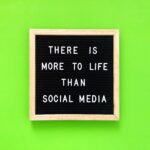Let’s start with a question: who are you online? Think about it for a moment. Is the digital identity you present an accurate reflection of the real you, or is it an edited, curated version designed to get likes, shares, and follows? This is the fascinating, sometimes unnerving, territory of digital identity. In the age of social media, we are more connected than ever, but at what cost to our personal boundaries online?
In this article, let’s dive deep into how social media is transforming the way we think about privacy, identity, and ethics. I promise it’s not just a dry academic subject—this affects you, me, and billions of others every day.
The Ethics of Sharing Personal Information Online: How Much Is Too Much?
Picture this: you’re scrolling through Instagram, and there’s your friend posting yet another photo of their avocado toast. Next comes a colleague’s beach vacation snaps, followed by a stranger’s deeply personal post about mental health struggles. All in the same feed, all shared publicly.
But where do we draw the line?
We’ve all become digital storytellers, curating our lives for an online audience. But in doing so, we’ve blurred the lines between what should remain personal and what’s shared publicly. This raises ethical questions: how much of our private lives should be out there for public consumption? Do we need to be transparent about everything?
The truth is, we often volunteer sensitive information without fully realizing the consequences. When you upload a photo or share a post, you might be thinking about the moment, the likes, or the comments. What you may not think about is how that information can be used—by companies, strangers, or even algorithms—to shape perceptions about who you are.
Social media platforms have essentially created an ethical gray zone. On the one hand, they encourage you to be authentic and share your true self. On the other, they collect and monetize your personal data. It’s like trading pieces of yourself for convenience and connection. But what happens to those pieces? And who gets to decide what’s done with them?
How Social Media Blurs the Lines Between Public and Private Life?
Remember when family photo albums were, well, private? You had to physically visit someone’s home to see them. Now, social media has turned your life into an open book—available 24/7 for anyone to flip through. And this shift isn’t just about sharing photos; it’s about the gradual erosion of boundaries.
The platforms we use daily thrive on oversharing. Every like, every post, every comment draws us into this intricate dance where public and private lives become intertwined. Suddenly, your weekend barbecue is as public as a news headline, and your thoughts on world events are broadcast to hundreds or even thousands of people.
But here’s the catch: the more we share, the more vulnerable we become.
When everyone is encouraged to share their personal moments, the boundaries that once protected our private selves start to dissolve. Social media companies are, in a way, nudging us toward this constant state of exposure. And it’s not just celebrities whose private lives are up for public scrutiny anymore—it’s all of us.
Have you ever posted something and immediately wondered if you overshared? That moment of hesitation is your instinct trying to protect your personal boundaries. But here’s the rub: in the world of social media, those boundaries are often harder to define and maintain.
Managing Digital Identity: Where Do We Go From Here?
Alright, now that we’ve unpacked the dilemma, here’s the million-dollar question: how can we manage our digital identities without losing our sense of self—or our privacy?
First, we need to become more intentional about what we share. Before you post, pause for a second. Ask yourself, why am I sharing this? Who benefits from this information? Is this something I want to be permanently attached to my online persona?
The reality is, we need to start treating our digital identities as seriously as we do our offline ones. Because once something is online, it’s often out there forever. You might delete a tweet or a photo, but the internet has a long memory—and so do the companies and individuals watching what you post.
Next, setting personal boundaries in the digital world means knowing when to step back. There’s a fine line between being connected and being too connected. We’ve all been there—mindlessly scrolling through feeds, feeling like we need to keep up, post more, share more. But digital wellbeing comes from drawing firm lines for ourselves: who can see what we post, what parts of our lives we keep offline, and how much time we spend on these platforms.
Also, remember that your digital identity is yours to control. Social media may pressure you to reveal more, but you’re the gatekeeper of your own life. You can curate what you share without losing your authenticity.
Finding the Balance: Connection vs. Privacy
So, is it possible to thrive in the digital age without sacrificing your personal boundaries? Absolutely! The key lies in finding a balance. Social media offers incredible opportunities for connection, self-expression, and even career growth. But to fully enjoy these benefits, we need to approach it with a sense of ethical responsibility—both to ourselves and to others.
This means being mindful of the why behind what we share and recognizing the potential impact on our privacy. It’s about being digitally savvy and setting boundaries that protect both your online and offline self. You don’t owe anyone access to your entire life, and it’s okay to keep parts of it just for you.
The future of digital identity is in our hands. As we continue to navigate this complex landscape, let’s prioritize our ethics, protect our boundaries, and ensure that our digital selves remain reflections of who we truly are—not what the algorithms want us to be.
So, who are you online? Maybe it’s time to take a closer look.
Click here to read our latest article Children and Social Media





